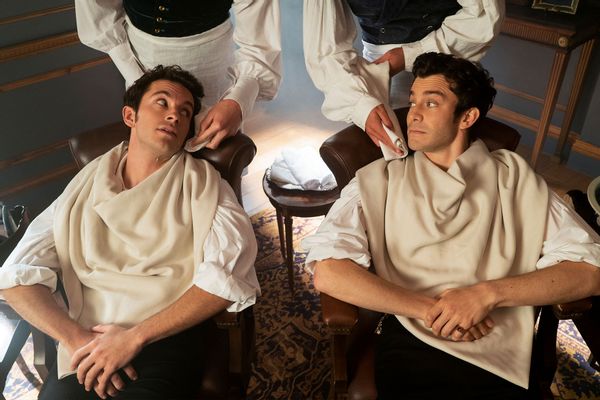
The first season of "Bridgerton" might have been all about Daphne's (Phoebe Dynevor) marriage to the Duke of Hastings (Regé-Jean Page), but Benedict's (Luke Thompson) interest in a male artist (Julian Ovenden) didn't go unnoticed by the show's fans. It suggested that the second eldest Bridgerton might actually be gay — or, at the very least, bisexual.
So when the show's second season appeared to backtrack as the character explored a heterosexual relationship with Tessa (Emily Barber), a woman from art school, fans were predictably upset. And their anger seems well placed in light of showrunner Chris Van Dusen recently giving an interview and saying that the character's storyline in Season 1 was not meant to suggest he was gay and that it was a "conscious choice" not to have his sexuality be fluid in Season 2.
It's still possible that the show's third season (the series has already been renewed through Season 4) will alter the course of Benedict's story once again. But there are a couple explanations for why the series is unlikely to feature a same-sex relationship for Benedict and doom him to be yet another one of TV's straight white boys.
RELATED: Why "Bridgerton" and "Sanditon" dialed back the sex – and came out stronger for it
There's no rule that says narrative arcs cannot be altered.
The first explanation is the most obvious, but it's also the easiest to ignore or fix given how arbitrary it is: Benedict being queer doesn't align with the character's storyline in the books. In "An Offer From a Gentleman," the third novel of author Julia Quinn's best-selling series, the character embarks on a very Cinderella-like story when he meets a young woman named Sophie at a masquerade ball.
But while the show is a pretty faithful adaptation of Quinn's novels when it comes to the gist of the Bridgerton clan's romances, there's no rule that says narrative arcs cannot be altered, especially if doing so would offer better representation or a more inclusive depiction of the world. We've already seen more people of color cast in starring roles – and as romantic interests – than in any other period drama (except perhaps Hulu's "The Great"). And so far, it's been nothing but a net positive.
The Great Bee Encounter of Season 2 plays out much differently in the novel.
Besides, we've already seen the series make changes to major storylines during adaptation; The Great Bee Encounter of Season 2 plays out much differently in the novel. By changing it for the screen, it frames and shapes Anthony (Jonathan Bailey) and Kate's (Simone Ashley) relationship much differently – making their eventual marriage one of mutual agency and love, not based on being compromised. (Daphne already did that in Season 1.) So, it'd be quite easy for the writers to alter Benedict's love story as well to feature a male love interest in place of Sophie.
The second explanation is a bit more complicated, less concrete, and admittedly requires a bit of reading between the lines. It has to do with Netflix itself and the way that the company operates globally. As we saw with the cancellation of "The Baby-Sitters Club," the streaming service's (apparent) goal is to grow its subscriber base outside of North America. One of the ways to do that is to bring the platform's biggest and most successful shows (think "Bridgerton," "Stranger Things," "The Witcher," etc.) to countries around the world. But if shows feature queer characters, it could potentially make doing this more difficult.
Want a daily wrap-up of all the news and commentary Salon has to offer? Subscribe to our morning newsletter, Crash Course.
Consider how Disney has been self-censoring its properties in order for them to be available in the sizable Chinese market. There are multiple cases of Beijing's censors removing same-sex kisses from films and eliminating scenes in which queer individuals' sexuality is mentioned. Now, Netflix is not currently available in China (or North Korea, Crimea, Russia, or Syria, for that matter), but the underlying idea is the same: It's possible that it is easier for the streaming service to release and promote content around the world when it conforms to certain (if limited) societal views. So if "Bridgerton" were to actually commit to Benedict being queer and embark on a storyline in which it is confirmed that he is canonically bisexual (and again, I stress that it should), it could potentially limit where the show streams and/or cost the company subscribers. That could even explain why Benedict's gay pal is nowhere to be seen this season; he's much easier to leave out than to edit out.

It would also, for lack of a better word, make the show a lot more interesting.
The London depicted in "Bridgerton" is already a more racially diverse world than exists in Quinn's novels. The show has also been been sex-positive in the past. It now has an opportunity to make a difference by further increasing its on-screen representation. By bringing a queer relationship to the forefront, the writers have a chance to tell a story that doesn't often get to be told, especially not on a major TV show. It would also, for lack of a better word, make the show a lot more interesting. Because with eight Bridgerton siblings potentially in need of love — and with the show already setting up a Colin (Luke Newton)/Penelope (Nicola Coughlan) romance — it's going to get pretty damn boring if everyone is straight.
More stories to check out:







